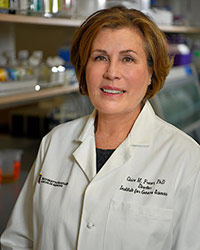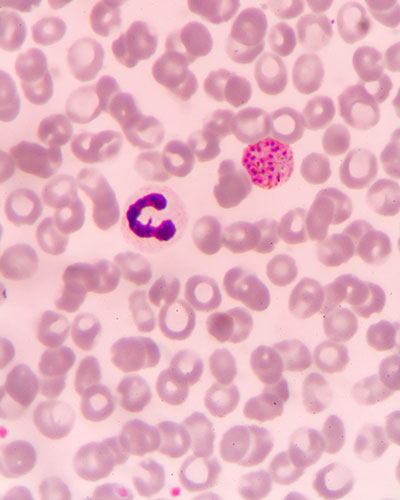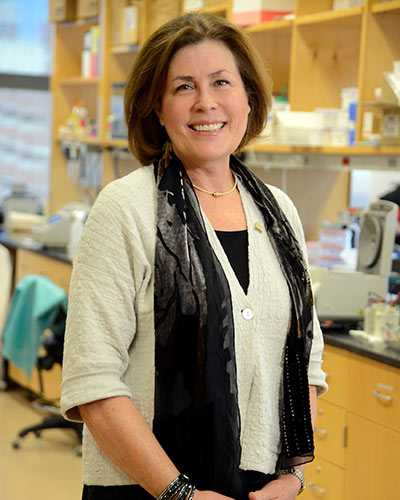April 04, 2019

The IGS Genome Center for Infectious Diseases is Funded for Five Additional Years
The Institute for Genome Sciences (IGS) at the University of Maryland School of Medicine (UMSOM) was awarded $17.5 million from the National Institute of Allergy and Infectious Diseases (NIAID) to fund the IGS Genome Center for Infectious Diseases (GCID) for another five years.
The Principal Investigator and Administrative Core Director for the grant, which is titled “A Genomics Based Investigation of the Determinants of Polymicrobial Infectious Disease Outcomes,” is David Rasko, PhD, Professor of Microbiology and Immunology and Scientist at IGS. Principal Investigators will include: Claire M. Fraser, PhD, the Dean’s Endowed Professor of Medicine, Microbiology and Immunology, and Director of IGS, and Owen R. White, PhD, Professor of Epidemiology and Public Health, Director of Bioinformatics and Associate Director of IGS.,
 The GCID uses large-scale genomics and bioinformatics approaches to investigate pathogen biology, virulence, immune evasion, microbe-microbe interactions as well as host-microbiome interactions. Scientific research projects focus on host/microbe interrelationships of diverse bacteria, fungi, and parasites. The interdisciplinary team will participate in the GCID research, including internationally recognized faculty from the Institute for Genome Sciences, the Department of Microbiology and Immunology and the UMSOM Center for Vaccine Development and Global Health (CVD) and their long-standing collaborators.
The GCID uses large-scale genomics and bioinformatics approaches to investigate pathogen biology, virulence, immune evasion, microbe-microbe interactions as well as host-microbiome interactions. Scientific research projects focus on host/microbe interrelationships of diverse bacteria, fungi, and parasites. The interdisciplinary team will participate in the GCID research, including internationally recognized faculty from the Institute for Genome Sciences, the Department of Microbiology and Immunology and the UMSOM Center for Vaccine Development and Global Health (CVD) and their long-standing collaborators.
“The GCID team has been in the forefront of applying genomic techniques to advance scientific understanding of infectious disease agents for the past 15 years, and this NIAID grant renewal will allow us to further deploy genomics approaches in the study of host-pathogen-microbiome interactions,” said Dr. Fraser.
 The NIAID grant will support research programs that focus on three areas. One research area involves studying the interactions of multiple bacteria with each other as well as the host and associated microbiome, which is led by Dr. Rasko, Dr. Fraser, and Herve S.G. Tettelin, PhD, Associate Professor of Microbiology and Immunology and Scientist at IGS.. The second area includes research into the genomic and transcriptomic analysis of fungal pathogens interacting with the host, which will be led by Vincent M. Bruno, PhD, Associate Professor of Microbiology and Immunology and Scientist at IGS. The third area of research includes an integrated genomics research project in parasitic tropical diseases that will be led by Julie C. Dunning Hotopp, PhD, Associate Professor of Microbiology and Immunology and Scientist at IGS, David Serre, PhD, Associate Professor of Microbiology and Immunology and Scientist at IGS; and Joana C. Silva, PhD, Associate Professor of Microbiology and Immunology and Scientist at IGS
The NIAID grant will support research programs that focus on three areas. One research area involves studying the interactions of multiple bacteria with each other as well as the host and associated microbiome, which is led by Dr. Rasko, Dr. Fraser, and Herve S.G. Tettelin, PhD, Associate Professor of Microbiology and Immunology and Scientist at IGS.. The second area includes research into the genomic and transcriptomic analysis of fungal pathogens interacting with the host, which will be led by Vincent M. Bruno, PhD, Associate Professor of Microbiology and Immunology and Scientist at IGS. The third area of research includes an integrated genomics research project in parasitic tropical diseases that will be led by Julie C. Dunning Hotopp, PhD, Associate Professor of Microbiology and Immunology and Scientist at IGS, David Serre, PhD, Associate Professor of Microbiology and Immunology and Scientist at IGS; and Joana C. Silva, PhD, Associate Professor of Microbiology and Immunology and Scientist at IGS
“This grant allows us to integrate the study of multiple pathogens in model systems and with human samples in a way that is more representative of natural infection processes, which will provide greater understanding and more in-depth insights into these interactions,” said Dr. Rasko.
The center also supports a Technology Core, a Data Management Core and an Administrative Core. The projects include whole genome and targeted genome sequencing, transcriptome profiling by RNA-seq, rRNA community profiling, and metagenomics and metatranscriptomic sequencing with a focus on the interactions of microbes with each other, the host and the resident microbiome. The sequencing will be performed using multiple platforms, including the Illumina MiSeq and HiSeq, Oxford Nanopore Technology and the Pacific Biosciences systems.
“Integrating genomics with diagnostic and clinical medicine has advanced our biological understanding of diseases and health,” says E. Albert Reece, MD, PhD, MBA, Vice President for Medical Affairs at the University of Maryland, and John Z. and Akiko K. Bowers Distinguished Professor and Dean of the University of Maryland School of Medicine. “This NIAID grant will foster new collaborations across disciplines within the clinical and research centers in the School of Medicine, as well as with international infectious disease communities.”
In addition to the research projects, IGS will establish workshops and continue educational initiatives to expand the understanding of how to apply genomics to high priority research questions that impact global health.
IGS has previously received grants as a Genome Center for Infectious Diseases (GCID) an NIAID-funded five-year grant (2014-2019); a Genome Sequencing Center for Infectious Diseases (GSCID); an NIAID-funded five-year contract (2009-2014), and the lead investigators have also had Principal Investigator roles with the NIAID-funded Microbial Sequencing Center (MSC), a five-year contract (2004-2009). This U19 grant with number U19 AI110820 will run for five years until 2024, representing twenty years of cutting edge research in genomic sciences.
About the University of Maryland School of Medicine
Now in its third century, the University of Maryland School of Medicine was chartered in 1807 as the first public medical school in the United States. It continues today as one of the fastest growing, top-tier biomedical research enterprises in the world -- with 43 academic departments, centers, institutes, and programs; and a faculty of more than 3,000 physicians, scientists, and allied health professionals, including members of the National Academy of Medicine and the National Academy of Sciences, and a distinguished recipient of the Albert E. Lasker Award in Medical Research. With an operating budget of more than $1 billion, the School of Medicine works closely in partnership with the University of Maryland Medical Center and Medical System to provide research-intensive, academic and clinically based care for more than 1.2 million patients each year. The School has over 2,500 students, residents, and fellows, and more than $530 million in extramural funding, with most of its academic departments highly ranked among all medical schools in the nation in research funding. As one of the seven professional schools that make up the University of Maryland, Baltimore campus, the School of Medicine has a total workforce of nearly 7,000 individuals. The combined School and Medical System (“University of Maryland Medicine”) has an annual budget of nearly $6 billion and an economic impact more than $15 billion on the state and local community. The School of Medicine faculty, which ranks as the 8th highest among public medical schools in research productivity, is an innovator in translational medicine, with 600 active patents and 24 start-up companies. The School works locally, nationally, and globally, with research and treatment facilities in 36 countries around the world. Visit medschool.umaryland.edu
About the Institute for Genome Sciences
The Institute for Genome Sciences, founded in 2007, is an international research center within the University of Maryland School of Medicine. Comprised of an interdisciplinary, multidepartment team of investigators, the Institute uses the powerful tools of genomics and bioinformatics to understand genome function in health and disease, to study molecular and cellular networks in a variety of model systems, and to generate data and bioinformatics resources of value to the international scientific community.
igs.umaryland.edu
Contact
Office of Public Affairs
655 West Baltimore Street
Bressler Research Building 14-002
Baltimore, Maryland 21201-1559
Contact Media Relations
(410) 706-5260
Joanne Morrison
Director of Marketing and Public Relations
Center for Vaccine Development and Global Health
University of Maryland School of Medicine
jmorrison@som.umaryland.edu
Office: (410) 706-2884
Mobile: (202) 841-3369
Related stories

Wednesday, August 28, 2024
Leading Computational Scientist and Oncology Researcher Elana Fertig, PhD, Appointed as New Director of the Institute for Genome Sciences at the University of Maryland School of Medicine
University of Maryland School of Medicine (UMSOM) Dean Mark T. Gladwin, MD, announced today the appointment of Elana J. Fertig, PhD, FAIMBE, as the new Director of the School’s Institute for Genome Sciences (IGS). She is an internationally-recognized researcher known for her work in integrating spatial multi-omics technologies with mathematical models to develop a new predictive medicine paradigm in cancer. Spatial technologies allow researchers to learn about any cell type inside of natural tissue, including gene activity and cell interactions.

Thursday, October 12, 2023
New Research Shows How Brain Inflammation in Children May Cause Neurological Disorders Such as Autism or Schizophrenia
Severe inflammation in early childhood is a clinically known risk factor for developing autism and schizophrenia. Now, for the first time, scientists from the University of Maryland School of Medicine (UMSOM) have discovered that inflammation alters the development of vulnerable brain cells, and this could have mechanistic links to neurodevelopmental disorders. This finding could lead to treatments for many different childhood-onset neurodevelopmental disorders.
.jpg)
Wednesday, May 03, 2023
University of Maryland School of Medicine Genomic Scientist Claire M. Fraser Elected to the National Academy of Sciences
The National Academy of Sciences (NAS) has announced that Claire M. Fraser, PhD, the Dean E. Albert Reece Endowed Professor in the Department of Medicine at the University of Maryland School of Medicine (UMSOM), and the Founding Director of the Institute for Genome Sciences (IGS), has been elected as a new member of the prestigious academy. Dr. Fraser is one of 120 U.S. and 23 international new members elected on May 2, 2023 to the NAS, bringing its total U.S. membership to 2,565 members.

Thursday, April 20, 2023
Researchers Discover Unique Genetic Signature for Mood Disorders in the Old Order Amish
Understanding the root causes of depression, bipolar disorder, and other mental illnesses could lead to new treatments for the 300 million people worldwide who suffer from such conditions.
.jpg)
Wednesday, March 01, 2023
Internationally-Renowned Scientist Claire Fraser, PhD, To Step Down as Director of the University of Maryland School of Medicine's Institute for Genome Sciences
Claire Fraser, PhD, a pioneer and global leader in genomic research, has announced that she will step down from her position as Director of the Institute for Genome Sciences (IGS) in the University of Maryland School of Medicine (UMSOM). She will now continue as the Dean E. Albert Reece Endowed Professor and Professor of Medicine and Microbiology and Immunology at UMSOM and scientist at IGS until she retires in 2024.

Friday, January 06, 2023
UM School of Medicine Scientists Create First Extensive Brain Cell Data Repository
Neuroscience researchers now have access to 50 million brain cells to better understand how the brain develops and functions or changes with disease or trauma. Last month, scientists at the University of Maryland School of Medicine’s (UMSOM) Institute for Genome Sciences (IGS) unveiled a “one-stop shop” for brain cell data called the Neuroscience Multi-Omic Archive (NeMO Archive). This archive is now available to neuroscience researchers to transform their understanding of the complex workings of the brain.

Thursday, July 28, 2022
Researchers Discover One of the Largest Known Bacteria-to-Animal Gene Transfer Inside a Fruit Fly
A fruit fly genome is not a just made up of fruit fly DNA – at least for one fruit fly species. New research from the University of Maryland School of Medicine’s (UMSOM) Institute for Genome Sciences (IGS) shows that one fruit fly species contains whole genomes of a kind of bacteria, making this finding the largest bacteria-to-animal transfer of genetic material ever discovered. The new research also sheds light on how this happens.

Wednesday, February 10, 2021
UM School of Medicine Researchers Release Extensive Data on Rare Variants through NHLBI TopMed Grant
Researchers at the University of Maryland School of Medicine (UMSOM) and their colleagues published a new analysis today in the journal Nature from genetic sequencing data of more than 53,000 individuals, primarily from minority populations. The early analysis, part of a large-scale program funded by the National Heart, Lung, and Blood Institute, examines one of the largest and most diverse data sets of high-quality whole genome sequencing, which makes up a person’s DNA. It provides new genetic insights into heart, lung, blood, and sleep disorders and how these conditions impact people with diverse racial and ethnic backgrounds, who are often underrepresented in genetic studies.

Tuesday, December 03, 2019
UM School of Medicine Researchers Institute for Genome Sciences' Researchers Discover Potential New Treatment for Tropical Parasitic Disease Using Genomics
Using innovative RNA sequencing techniques, researchers at the University of Maryland School of Medicine (UMSOM) Institute for Genome Sciences identified a promising novel treatment for lymphatic filariasis, a disabling parasitic disease that is difficult to treat. The potential new therapy is an experimental cancer drug called JQ1 and targets proteins found prominently in the worm’s genome; it appears to effectively kill the adult worms in a laboratory setting, according to the study which was published today in the journal mSystems.

Tuesday, August 13, 2019
Researchers Identify How Vaginal Microbiome Can Elicit Resistance or Susceptibility to Chlamydia
The vaginal microbiome is believed to protect women against Chlamydia trachomatis, the etiological agent of the most prevalent sexually transmitted infections (STIs) in developed countries. New research by the University of Maryland School of Medicine (UMSOM) shows how the microbiome can either protect or make a woman more susceptible to these serious infections.

Wednesday, March 27, 2019
New Study Finds That Bacteria and Immunity in the Cervix May be Key to Predicting Premature Birth
Spontaneous preterm birth (sPTB), defined as birth before 37 weeks of gestation, and the related complications, are the largest contributors to infant death in the United States and worldwide, according to the World Health Organization. Researchers at the University of Maryland School of Medicine (UMSOM) have discovered that bacteria and innate immune factors in a woman’s birth canal and cervix may increase the risk of spontaneous preterm birth or provide protection against such births.

Tuesday, February 12, 2019
UMSOM Scientists Call for Unrestricted Usage of Public Genome Data
Researchers at the Institute for Genome Sciences (IGS) at the University of Maryland School of Medicine (UMSOM) called for open access to genome data, stating that unrestricted usage is needed for progress in combating the world’s most serious diseases.

Friday, February 08, 2019
University of Maryland School of Medicine Genome Scientists Develop Novel Approaches to Studying the Most Widespread Form of Malaria
Scientists at the Institute of Genome Sciences (IGS) at the University of Maryland School of Medicine (UMSOM) have developed a novel way with genome sequences to study and better understand transmission, treat and ultimately eradicate Plasmodium vivax, the most widespread form of malaria.

Thursday, September 27, 2018
University of Maryland School of Medicine Scientist Receives Prestigious Microbiome Award
Owen White, PhD, professor of epidemiology and public health, and Associate Director for Informatics at the Institute for Genome Sciences (IGS) at the University of Maryland School of Medicine (UMSOM), has received the 2018 Microbiome Pioneer Award. The prestigious honor is part of the Bioinformatics for the Microbiome Symposium organized by Stanford University. The microbiome is the name given collectively to the community of trillions of microbial organisms that live on and within our bodies.

Monday, May 14, 2018
New Research: Some Gut Bacteria May Protect Against Intestinal Infection
Scientists at the University of Maryland School of Medicine (UMSOM) have for the first time found evidence that the presence of a key species in the human gut microbiome is associated with protection from infection with typhoid fever. If the research is borne out, it could offer an exciting new way to reduce intestinal infections from microbes.

Wednesday, May 25, 2016
UMSOM Researchers Develop New Way to Decode Large Amounts of Biological Data
A University of Maryland School of Medicine researcher has helped develop an innovative computing technique that, on very large amounts of data, is both faster and more accurate than current methods. To spur research, a program using this technique is being offered for free to the biomedical research community.
